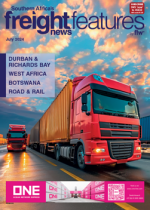A notable upturn in road freight volumes across several regions, spurred by robust economic rebound following the Covid-19 pandemic and a surge in online retail transactions, bodes well for the transport sector, says Louis Marais, general manager of commercial at Dunlop Tyres."There have been significant investments in road infrastructure to improve connectivity and reduce congestion, with key projects such as the N3 highway upgrade and various provincial road improvements. We also see increased intelligent transport systems (ITS) implementation for better traffic management and accident prevention."Marais says the rise of e-commerce has been a massive force driving change in the road sector as demand for efficient last-mile services has necessitated innovations in logistics and delivery network optimisation."Overall, the outlook for road freight in South Africa is very optimistic, with growth driven by economic recovery, urbanisation and technological advancements. The sector does, however, have some serious challenges that it needs to navigate, particularly around fuel price volatility, environmental regulations and competitive pressures from rail transport."According to Marais, there has been a drive for improved rail solutions in South Africa. Upgrading existing rail infrastructure and rolling stock, including introducing high-speed trains and modern signalling systems, indicated more to come."There have also been more collaborations between the government and private sector to fund and manage rail projects, enhancing efficiency and service quality. A focus on improving freight rail services to reduce road congestion and support economic activities, particularly in mining and industrial sectors, is a growing t rend."Dunlop Tyres, the only local tyre manufacturer to offer free Dunlop Sure truck tyre insurance for 18 months through a Dunlop branded dealer, have been service providers to the South African road freight sector for many years."While government and the private sector are investing significantly in rail infrastructure and plans to modernise rail networks that could potentially increase rail freight volumes, there are still many challenges to navigate before rail will be successful in the country."He said some significant challenges facing the rail freight sector included ageing infrastructure and operational inefficiencies. "The investment in modernising the infrastructure is often inadequate, compounding the problem over time. Inefficiencies in rail operations, such as frequent breakdowns of trains and slow turnaround times at terminals, disrupt the logistics chain. Poorly maintained trains are prone to frequent mechanical problems, and congestion at loading and unloading points delays the movement of goods, impacting delivery schedules."Marais said the rail network also struggled to handle increased cargo volumes due to inadequate terminal facilities, and rail infrastructure was often targeted for theft and vandalism.He said that despite the country's reliance on road transport and the issues plaguing the railways, the road sector faced its fair share of challenges. "Many roads in South Africa are in poor condition due to inadequate maintenance. Potholes, worn-out surfaces, and poorly maintained road shoulders cause frequent vehicle and tyre damage. This leads to an increase in maintenance cost to the logistics company," he told Freight News. "South Africa also has a high incidence of road accidents, often caused by reckless driving, poor road conditions, and overloading. This not only endangers the lives of drivers and passengers but also poses a risk to the transported goods. Additionally, hijackings and armed robberies targeting transport vehicles further compromise cargo security. Looting of trucks when a truck has a breakdown is also a huge concern for logistics companies. "He said the volatility of fuel prices was another ongoing issue for transporters.

